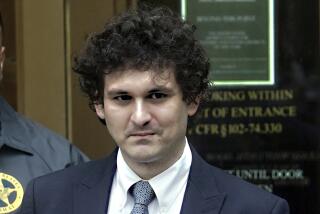Ex-Lehman CEO blames government for firm’s collapse
- Share via
Reporting from Washington — The former chief executive of Lehman Bros. came out swinging at federal officials Wednesday, blaming them for failing to give the beleaguered investment banking firm the extraordinary help it gave to its rivals — aid that would have saved it from the 2008 collapse that helped trigger the worldwide financial crisis.
A defiant Richard S. Fuld Jr. sparred with Federal Reserve officials during a hearing before a congressionally appointed panel investigating the financial crisis. The panel is wrestling with the complex question of why some financial institutions were deemed too big to fail and others were allowed to fall apart.
Fuld said Lehman made many mistakes that, combined with “uncontrollable market forces” and rumors, put it on the brink of bankruptcy the weekend of Sept. 13, 2008. But he said Lehman could have been saved if the Fed had given it access to money under a special program for investment banks.
“Lehman was forced into bankruptcy not because it neglected to act responsibly or seek solutions to the crisis but because of a decision, based on flawed information, not to provide Lehman with the support given to each of its competitors,” Fuld told the Financial Crisis Inquiry Commission.
A customer run on Lehman to pull out money left it short of cash that weekend, and it needed a “liquidity bridge” to get over the crisis, Fuld said.
But Thomas C. Baxter Jr., general counsel for the Federal Reserve Bank of New York, said such a loan would have been “a bridge to nowhere.”
Fed officials, Baxter said, determined that Lehman did not have the collateral to back a loan of tens of billions of dollars, that the market had lost confidence in the firm and that no other company was able to purchase it quickly.
The commission must deliver a report to President Obama and Congress by Dec. 15 that explains the causes of the crisis and the reasons for the problems at every major financial institution that was bailed out or allowed to fail.
This week, the panel is focusing on government decisions that allowed Lehman Bros. to collapse but approved federal aid a few weeks later to help save Wachovia Corp., the nation’s fourth-largest banking company at the time.
“The real question before us is: How did we end up with only two choices: either bail out the banks, or watch our world sink?” said the panel’s chairman, Phil Angelides, who suggested political reasons also bore on why Lehman was not saved.
Federal regulators told the panel that the recently enacted financial reform legislation would help avoid future problems by providing new powers to seize and dismantle troubled firms.
But those tools were not available in September 2008.
Fed Chairman Ben S. Bernanke, former Treasury Secretary Henry M. Paulson and current Treasury Secretary Timothy F. Geithner, who headed the New York Federal Reserve Bank at the time, tried to engineer a sale of Lehman.
But they decided not to provide government money to help secure a deal, as the Fed had done in March 2008 to help save investment bank Bear Stearns.
Federal Reserve counsel Scott G. Alvarez told the commission that the central bank couldn’t take the risk that Lehman would be unable to save itself.
“I think that if the Federal Reserve had lent to Lehman … this hearing and all other hearings would have only been about how we had wasted the taxpayers’ money, and I don’t expect we would have been repaid,” Alvarez said.
But Fuld said that with Fed money Lehman would have been able to survive long enough for an acquisition or an orderly dismantling of the company, “which would have alleviated the crisis that ensued.”
Lehman’s collapse sent U.S. and world stock markets plummeting and put insurance giant American International Group Inc. on the brink of collapse. Federal officials stepped in to save AIG, then successfully pushed Congress to approve the $700-billion bank bailout fund.
During that hectic time, Wachovia teetered near collapse, and federal regulators helped engineer a deal to sell it to Citigroup Inc. The Federal Deposit Insurance Corp. would have been responsible for losses above $42 billion incurred by Citigroup as a result of the acquisition.
But Wells Fargo & Co. then struck a deal to take over Wachovia that required no federal support after the Internal Revenue Service changed its tax rules for how banks could write off losses caused by acquisitions.
Bill Thomas, the financial crisis commission’s vice chairman, said the “extreme fundamental change in the tax code” still cost taxpayers money but allowed the Fed and the FDIC to avoid direct government support to keep Wachovia from failing. Congress within months reversed the IRS change, preventing its use by other banks.
jim.puzzanghera@latimes.com
More to Read
Inside the business of entertainment
The Wide Shot brings you news, analysis and insights on everything from streaming wars to production — and what it all means for the future.
You may occasionally receive promotional content from the Los Angeles Times.










